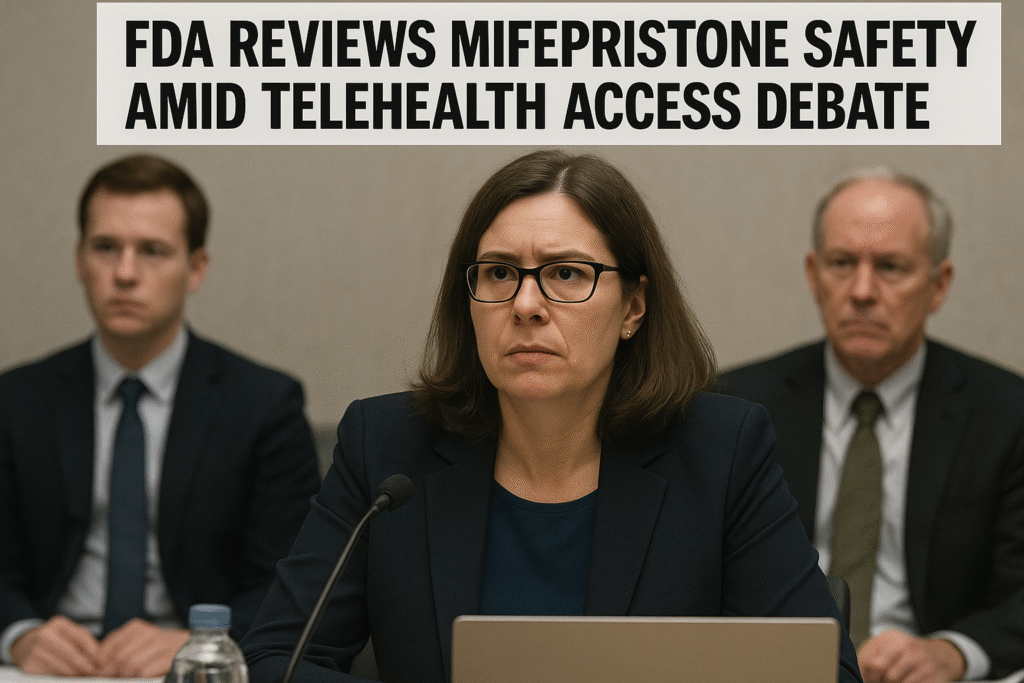By Harshit | September 27, 2025 | Washington, D.C. | 1:36 AM EDT
The U.S. Food and Drug Administration is reviewing the safety and efficacy of mifepristone, a key drug used in medication abortion, as federal officials weigh how it can be safely dispensed, according to a recent letter from Health and Human Services Secretary Robert F. Kennedy Jr. and FDA Commissioner Dr. Marty Makary. The letter, addressed to 22 Republican state attorneys general, said the FDA will conduct its own evaluation of “real-world outcomes and evidence” to ensure women’s health is protected.
“This administration will ensure that women’s health is properly protected by thoroughly investigating the circumstances under which mifepristone can be safely dispensed,” the officials wrote on September 19.
The announcement has sparked concern among abortion advocates that new restrictions could be introduced, particularly as medication abortion has become increasingly available through telehealth in recent years.
Safety Review Under Scrutiny
Kennedy told the Senate earlier this month that the FDA is collecting new data for a safety review of mifepristone, claiming that the previous administration “twisted the data” to hide potential safety signals. He did not provide further details about these concerns.
Republican attorneys general cited a report from the Ethics and Public Policy Center suggesting mifepristone may carry risks that warrant stricter oversight. Kennedy and Makary referenced the report in their letter, noting “potential dangers that may attend offering mifepristone without sufficient medical support or supervision.”
Many medical experts, however, criticized the report as lacking scientific credibility. Dr. Ushma Upadhyay, associate professor at UCSF, noted that the paper provided little information about data sources and overestimated risks. She explained that emergency room visits were counted as serious adverse events, even when no treatment was needed.
The Society of Family Planning, a nonprofit focused on abortion research, urged the FDA to dismiss the report, stating it was “not a methodologically rigorous, evidence-based resource” and does not warrant consideration in scientific or regulatory spaces.
Mifepristone’s Track Record
Mifepristone, used in combination with misoprostol, was approved by the FDA in 2000 for medication abortion up to 10 weeks of gestation. Clinical trials and decades of use have demonstrated its safety and effectiveness. According to the FDA, there have been only five deaths for every 1 million people who used the drug, equating to a 0.0005% mortality rate—comparable to common over-the-counter medications such as ibuprofen and acetaminophen.
Major medical organizations, including the American College of Obstetricians and Gynecologists, have consistently advocated for broader access to mifepristone. During the COVID-19 pandemic, telehealth prescriptions and mail delivery of the drug were authorized, expanding access for patients in rural areas with limited clinic availability.
Political Debate and Regulatory Pressure
Anti-abortion advocates continue to argue that mifepristone is unsafe and that the FDA has not sufficiently studied it. Some Republican officials have called for rescinding telemedicine policies and limiting distribution to in-person visits.
The issue gained prominence following the 2022 Dobbs v. Jackson Women’s Health Organization Supreme Court decision, which revoked the federal right to abortion. Since then, 20 states have enacted bans or severe restrictions, while others have strengthened protections for abortion care.
In 2024, more than 1 million abortions were performed in the United States, according to the Guttmacher Institute. Medication abortion delivered via telehealth has contributed to this increase, accounting for roughly 14% of procedures—up from 10% in 2023, representing about 40,000 additional cases.
Looking Ahead
The FDA’s ongoing review of mifepristone underscores the intersection of medicine, public health, and policy in the United States. Advocates argue that telehealth access is essential for ensuring safe and equitable reproductive care, while opponents call for stricter oversight.
As the agency evaluates evidence from decades of clinical experience and real-world use, patients and healthcare providers are closely monitoring potential changes that could impact the accessibility of medication abortion. Experts emphasize that any policy decisions should be guided by rigorous science, patient safety, and access to care.







